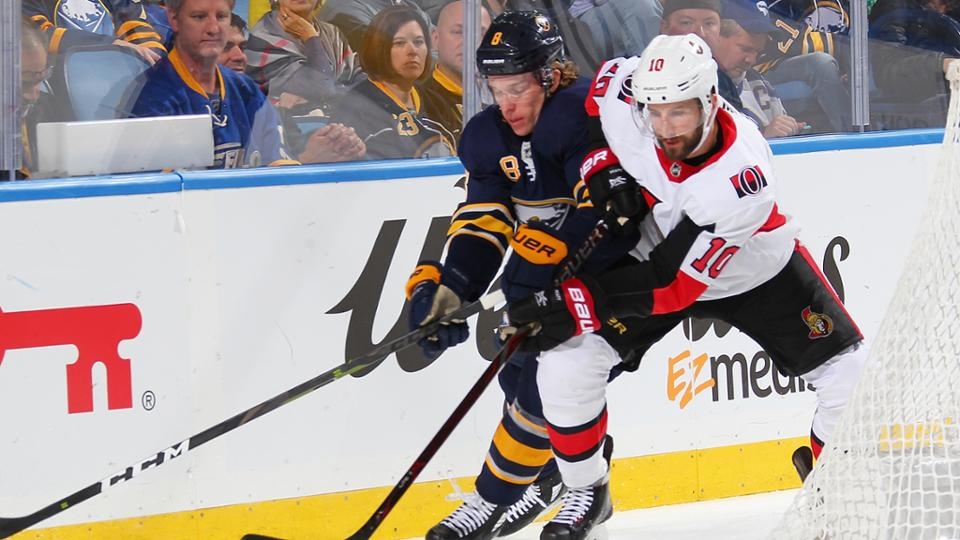
The Importance of Sample Size and the Senators’ Hot Start
The Ottawa Senators celebrate after a road win against the Montreal Canadiens. Photo credit: Francois Lacasse/Getty Images
If the early going of the NHL regular season has taught us anything over the years, it’s that small sample sizes can be deceiving.
Just ask the Toronto Maple Leafs, or the latest sample size victim, the Colorado Avalanche. But we’ll get to that later. For now, let’s focus on the Ottawa Senators.
The Senators have had a solid start to the 2014-15 campaign with a 6-3-2 record. They deserve credit for the hot start after a disappointing 2013-14 season in which they finished 37-31-14 and missed the playoffs.
Instead of adhering to sports clichés and deducing the Senators’ play to intangibles and unquantifiable traits, let’s look at the statistics.
The Senators placed 21st in the NHL last season in Fenwick For Percentage with a 49.68 per cent, according to War on Ice. For those unaware, Fenwick is a statistic that measures puck-possession by tracking shots on goal and shots missed in the offensive zone while even-strength. The idea is the team possessing the puck more frequently, without the advantages of special teams, has a better chance of winning.

Ottawa faltered in this department and it was reflected by their position in the standings. It also didn’t help that goaltender Craig Anderson regressed after his stellar 2012-13 season in which he posted a .941 save percentage in 24 games. Again, sample size is to be considered here. Anderson has a career .915 save percentage, which is good enough to make him an above average starting goaltender in the NHL. It was unreasonable to expect him to play anywhere near to the level he did in the shortened season, and coupled with the Senators weak puck-possession, the lights went out on their playoff hopes.
Consider that in the shortened season the Senators ranked ninth in Fenwick For Percentage with a 51.92 per cent. Coupled with superb goaltending, Ottawa earned a playoff spot with a 25-17-6 record.
This season, however, the Senators’ play has raised some red flags in terms of sustainability. They rank 28th in the league in Fenwick For Percentage, possessing the puck only 46.06 per cent of the time. Now it should be noted that teams have overcome this in the past, the latest team being the Colorado Avalanche last season, but a quick look at their results in the present reveals getting heavily out-possessed is not a recipe for success. It happened to the Toronto Maple Leafs after they made the playoffs in the shortened season, only to collapse the following year. They relied too heavily on their goaltenders.
Pertaining to the Senators, they currently have a PDO rating of 102.32, which ranks them fourth in the league, according Behind the Net. PDO measures even-strength shooting percentage and save percentage as a proxy for “puck luck.” Teams significantly above 100 are expected to regress, while teams below 100 are expected to bounce back. This essentially suggests that teams cannot expect long-term success with weak puck-possession or inflated shooting percentages that are bound to drop.
Now consider the Senators are fifth in the league in even-strength save percentage with a tremendous .944 this season. This is obviously a good thing, and Anderson and Robin Lehner should take a bow, but to demand that sort of workload from your goaltenders on a consistent basis probably doesn’t bode well for Ottawa’s playoff hopes.
It is important to emphasize sample size once again, as it is entirely possible the Senators tighten up their play and give reason for long-term optimism. With young players like Curtis Lazar, Kyle Turris and Mark Stone, among others, taking on the mantle of the team’s future, there is room to improve here, especially considering their strong prospect pool.
It is for that reason the Senators remain an intriguing wildcard in the Eastern Conference. They have displayed strong puck-possession in the past, but consistency remains an issue. Time will tell here.













